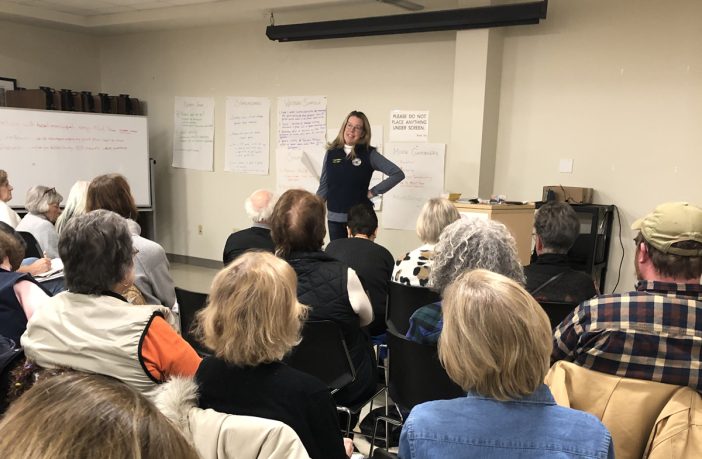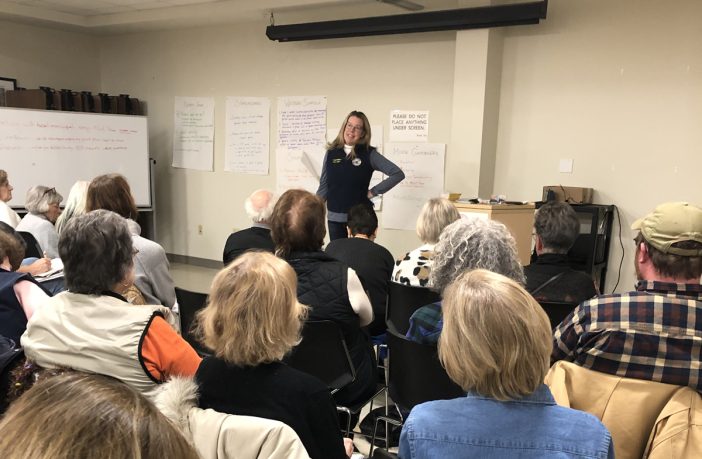New coalition advances pollinator-friendly horticulture in Suffolk


A broad alliance of civic groups, environmental organizations and garden clubs from across Suffolk County has created a new coalition that will promote safe local habitats for pollinating insects and wildlife, whose existence is critical to the survival of flowers, fruits and plants. harvest.
The Suffolk Alliance of Pollinators (SAP), initiated by Suffolk County Cornell Cooperative Extension (CCE Suffolk), a nonprofit community education agency, will work to make Suffolk County gardens friendly to pollinators by creating habitat and food sources for bees and butterflies. , hummingbirds and other pollinating insects and wild animals.
The Alliance held its kick-off event earlier this month at CCE Suffolk’s Riverhead headquarters in front of more than a hundred stand-alone gardeners. Participants included both heads of organizations and chief gardeners of Suffolk County.
Pollinators are vital to agriculture, food systems and ecosystems. They help thousands of flowering plants reproduce. Pollinator habitat also helps prevent soil erosion and improve biodiversity.
The mission of the Suffolk Pollinator Alliance is directly linked to that of the Pollinator Way, a national volunteer organization working to create pollinator-friendly habitats along a series of continuous “corridors” across the country. Since its inception in 2017, walkways have been installed in over 200 cities in New York, Connecticut, Massachusetts, Pennsylvania and seven other states, as well as Ontario.
Pollinator populations have declined dramatically in recent years due to pesticide use and habitat loss. The bee population has declined significantly, and the number of monarch butterflies has declined by 94.6% over the past 20 years. United States Wildlife Federation.
SAP will promote a pollinator-friendly environment by educating home gardeners in new approaches to lawn care, promoting native plant cultivation, implementing best gardening practices and avoiding pesticides. This grassroots coalition will implement outreach programs through public libraries and a number of municipalities.
“Many local groups are already involved in protecting pollinators,” said Roxanne Zimmer, CCE Suffolk Community horticulturalist and organizer of the Suffolk Pollinator Alliance. “Our new alliance will serve as a unifying platform to help share ideas and amplify our voices.”
“CCE Suffolk is proud to be leading this initiative,” said Vanessa Lokel, chief executive of CCE Suffolk. “Pollinators are the backbone of a healthy environment and we are excited to bring these groups together to achieve the common goal of creating a pollinator-friendly Suffolk County.”
Suffolk County Legislator Kara Khan attended the launch event and reminded those in attendance of the county’s ongoing commitment to preserving the environment.
“The creation of the Suffolk Pollinator Alliance reflects the mutual desire of our communities to create a healthier and more vibrant Suffolk County,” Hahn said. “I am confident that, in the hands of CCE Suffolk, this initiative will encourage residents to rethink their plantings, learn more about how they can help protect our pollinating insects and birds, and build effective pathways to support their survival.”
Pollination, according to the US Forest Service, is “a critical function of ecological survival. Without pollinators, the human race and all of Earth’s terrestrial ecosystems would not survive. Of the 1,400 crops grown worldwide, nearly 80 percent require animal pollination.”
To learn more about CCE Suffolk’s horticultural initiatives, visit https://ccesuffolk.org/horticulture.
For questions regarding the Suffolk Pollinators Alliance, please contact Roxanne Zimmer at: [email protected] or (631) 727-7850 ext. 207.
Dallas Press News – Latest News:
Dallas Local News || Fort Worth Local News | Texas State News || Crime and Safety News || National news || Business News || Health News
texasstandard.news contributed to this report.










